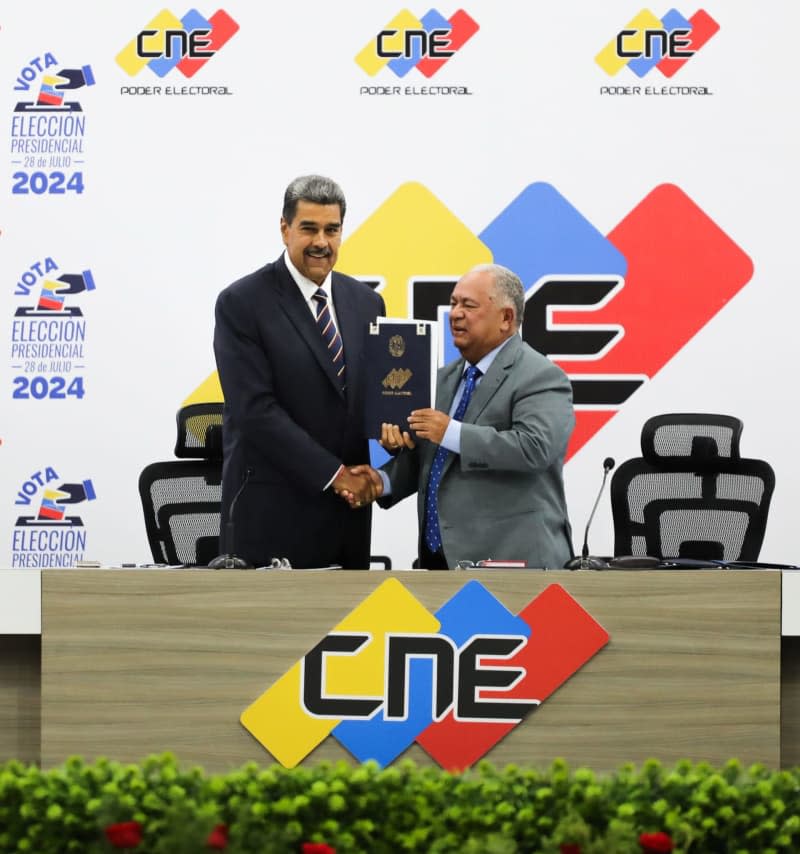Venezuela’s National Electoral Council (CNE) on Monday officially declared authoritarian President Nicolás Maduro the victor of Sunday’s controversial presidential election, as opposition figures rejected the result and world leaders expressed concern.
According to official figures, Maduro received 51.2% of the vote, with opposition candidate Edmundo González Urrutia on 44.2%.
The left-wing Maduro is now due to begin his third six-year term as president in January 2025.
The result has been met with heavy criticism from opposition figures in Venezuela and leaders abroad, with a number of Latin American countries expressing doubts about the legitimacy of Maduro’s victory.
Venezuelan opposition leader María Corina Machado, who was banned from holding public office for 15 years due to alleged irregularities from her time as a member of parliament, claimed the opposition had secured 70% of the vote.
On Monday evening the opposition said it had obtained more than 70% of the tally sheets for the election, which showed González was ahead of Maduro.
“We won and the whole world knows that,” Corina Machado told journalists.
The 56-year-old industrial engineer referred to post-election polls and four independent projections as well as the actual counting results. “This is the largest margin of victory in history,” she said.
Corina Machado was seen as the driving force behind González’s candidacy. The 74-year-old diplomat was previously largely unknown in the country.
“Venezuelans and the whole world know what happened on election day today,” he said.
Observatorio de Conflictos, a Venezuelan human rights organization, said it had registered 187 protests across 20 states by Monday evening.
Earlier in the day, protesters had taken to the street with a “cacerolazo” – a noisy beating of pots and pans – according to a report in the newspaper El Nacional.
Worries ahead of vote count
Ahead of the vote, few observers inside or outside Venezuela expected a free and fair election.
In the run-up to election day, numerous members of the opposition were detained and candidates critical of the government were not allowed to run.
The European Union was not represented with observers at the vote as Venezuela’s electoral authority revoked an invitation due to existing personal sanctions against CNE representatives.
According to Panamanian authorities, four Latin American ex-presidents were prevented from travelling to observe the election on Friday.
Although the United Nations sent some election experts, their roles were limited as the body does not make public statements to assess the electoral process.
A total of around 21.6 million people were eligible to vote, including Venezuelans abroad.
Ten candidates ran in the presidential election, with several opinion polls prior to the election placing González ahead of Maduro, who has been in charge of the South American country for 11 turbulent years.
EU calls for transparency
The election results had not been verified and could not yet be considered as “representative of the will of the people of Venezuela,” top EU diplomat Josep Borrell said.
Borrell called for immediate access to the voting records of each polling station and the publication of disaggregated election results. Authorities also needed to ensure the full and timely investigation of any post-electoral complaints and grievances, he said.
“Credible reports from domestic and international observers indicate that the elections were marred by numerous flaws and irregularities,” Borrell said.
“The EU will continue to pursue all political and diplomatic efforts in support of dialogue and a peaceful and negotiated way out of the political crisis.”
US has ‘seriousconcerns’ about results
Hours after the CNE announcement proclaiming Maduro the winner, US Secretary of State Antony Blinken, on a visit to Japan, questioned the results.
“We have serious concerns that the result announced does not reflect the will or the votes of the Venezuelan people,” Blinken said in Tokyo on Monday.
He called on the electoral commission to publish the full results and “to immediately share information with the opposition and independent observers.”
Blinken added: “The international community is watching this very closely and will respond accordingly.”
Chile, Guatemala express doubts as Putin congratulates Maduro
“The Maduro regime must realize that the results it publishes are hard to believe,” Chilean President Gabriel Boric wrote on the social media platform X.
“Chile will not recognize any result that is not verifiable,” he added.
His Guatemalan counterpart Bernardo Arévalo wrote: “We have received the results announced by the CNE with great doubt.”
Other left-wing Latin American leaders were quick to congratulate Maduro, including the heads of state of Cuba, Nicaragua, Bolivia and Honduras. China did too.
“China and Venezuela are good friends and partners who support each other,” a Foreign Ministry spokesman said in Beijing.
Russian President Vladimir Putin also celebrated Maduro’s re-election. In a letter published by the Kremlin, Putin conveyed his “warmest congratulations.”
“Russian-Venezuelan relations have the character of a strategic partnership. I am convinced that your actions as the head of state will continue to enable progressive development in all directions,” Putin continued.
“Remember that you are always a welcome guest in Russia,” Putin wrote in his letter.
Venezuela descends into poverty under Maduro
Maduro’s last election victory in 2018 was widely criticized as undemocratic and not recognized internationally by many countries.
His time in office has seen an economic meltdown – including hyperinflation, acute goods shortages and a plunge in oil production – which has driven about 7.7 million Venezuelans to flee abroad, according to the UN.
More than 80% of the population live below the poverty line.
He has also cracked down on the opposition, with UN investigators accusing the government of grave human rights violations, including thousands of killings by security forces.
Maduro, a former trade unionist and bus driver, was first elected president in April 2013 after the death of his predecessor Hugo Chávez, under whom he had served as vice president.
But, despite the economic turmoil and US-backed attempts to oust him, Maduro has been able to cling to power.









